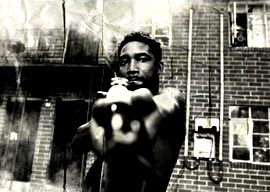
January 02, 2012

The Bluff
The Bluff wasn’t always this exciting. A hundred years ago, the English Avenue area was predominantly white and working-class, with Simpson Avenue an unofficial dividing line between English Avenue whites and Vine City blacks. Despite some stiff resistance—intransigent whites were suspected of bombing the English Avenue Elementary School as recently as 1960—blacks eventually encroached north of Simpson Avenue, which is now renamed after another Georgia civil-rights leader, Joseph E. Boone.
When Atlanta blacks rioted in 1966 and chanted things such as “black power,” “white devil,” and “kill the white cops,” MLK described it as “the desperate language of the unheard.” When Vine City blacks smashed windows in white-owned stores in 1967, apparently egged on by a “crudely lettered handbill” claiming that “White peope [sic] own our stores. White people own the housing we live in” and urging rioters to “Clean up Atlanta tonight,” the remaining white residents in The Bluff heard the “desperate language” loud and clear—nearly all of them left. A “civil-rights” movement ostensibly aimed at desegregation merely resulted in resegregation—this time both racial and economic. The Bluff is now 97 percent black. A pie chart of its racial breakdown looks like Pac-Man eating the world. It is also overwhelmingly poor.
Cue the sociologists to misunderstand everything about this warped little society, to urge “a multitude of intellectual discourses” in their blind efforts aimed at “empowering marginalized, at-risk individuals” by employing a “comprehensive prevention and wellness approach” that in practice usually amounts to little more than handing out free needles and plastic sippy cups of liquid methadone. Watch the experts shoot in the dark as they claim the area has been victimized by external rather than internal forces, that it is “plagued” by “issues,” how it is a “neglected” and “forgotten” community beleaguered by “underperforming schools” rather than ineducable students.
Cue the fat-necked politicians to stroll The Bluff’s blown-out streets being photographed for campaign ads in oddly inappropriate Tor Johnson zombie poses, blaming the homeowners who fled the area rather than the residents who scared them into fleeing. Atlanta councilman Ivory Lee Young Jr. said it isn’t the gun-wielding gangbangers who are guilty of “terrorism”—it’s the people they frightened into the suburbs. Young concedes that the city’s taxpayers have already tossed nearly $100 million to help pump life into The Bluff since the late 1980s in one failed revitalization project after the next—that’s about $25K per illiterate, dope-slinging resident—yet he insists that more needs to be done and is threatening to seize abandoned homes via eminent domain. Young recently boasted of having helped convince Walmart to build a new store on The Bluff’s fringes, and all it took the retail empire to agree was a stipulation allowing for “an on-site police precinct.” Despite the hundred million that’s already disappeared down the Bluffhole due to ineptitude and corruption, city leaders now promise that a mere Walmart will turn the whole lunar wasteland around and keep hope—or at least reelection hopes—alive.
As these barking cardboard icons pose for photo ops in front of boarded-up shotgun shacks, they’ll insist the area needs “re-branding,” but never a repopulating. The unspoken truth about areas such as The Bluff isn’t that it’s low on city services—it’s nearly devoid of worthwhile human capital. If the 1960s “civil rights” movement benefited anyone, it was the black professional class, because it allowed them to escape into better, mostly white areas. It left the black lumpenproles to fester in urban quadrants that devolved into living horror movies such as The Bluff and modern Detroit.
A question the well-funded sociologists and overpaid politicians never seem brave enough to pose is why conditions always seem to degenerate when an area becomes majority-black. It’s deemed hateful to ask why Haiti melted into putrefaction after they slaughtered all the French or why Zimbabwe went to seed when they started decapitating the white farmers. Scanning the globe, it’s hard to deny that conditions are better for blacks when they’re around whites than when they aren’t. Why is that? It’s an honest question based on honest observations. One needn’t inject “hate” into that question—or maybe one does, if one wants to avoid the question altogether. And until one can ask that question without fear of being charged with a hate crime—or at least a career-destroying thoughtcrime—there will never be answers for places such as The Bluff.